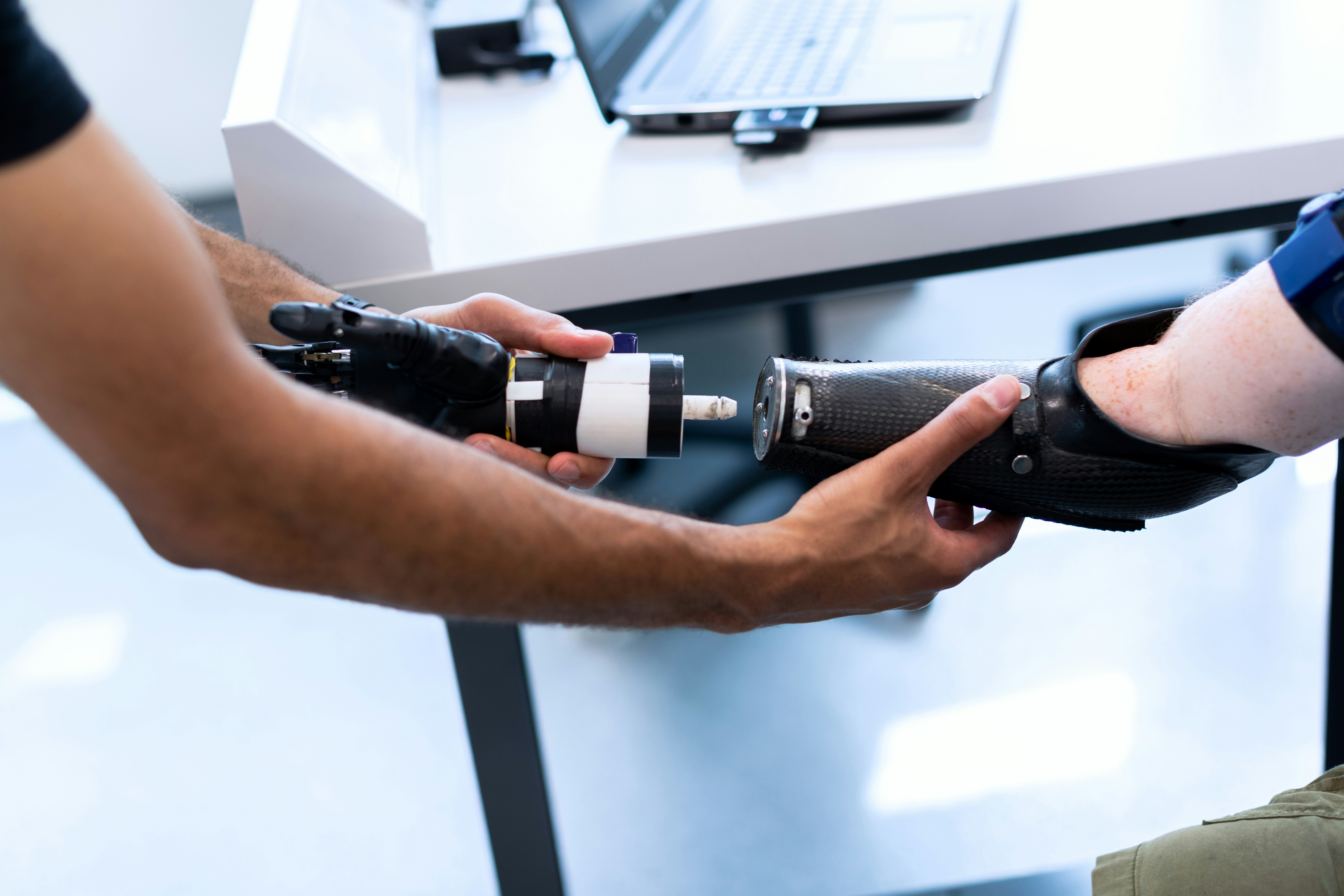Strategies for Recruiting Top Talent for Medtech Careers
17 Jun, 202415 minsThe rapid market growth in the medtech industry and large demand for specialised medtech pro...

The rapid market growth in the medtech industry and large demand for specialised medtech professionals means employers must master the recruitment process to attract and retain specialised talent to their business. Becoming an expert on who to hire for different medtech teams and the distinct skills and qualities to search for within candidates is essential for helping professionals build successful medtech careers.
In this guide, we will explore the key medtech recruitment strategies employers must use to attract and retain top medtech talent. We will also delve into the distinctive areas in medtech, advising employers on who to hire for each team and the essential skills and qualities hiring managers should look for in a proficient medtech candidate.
When discussing who your business should hire for different teams, we will cover the following:
Who to Hire for Digital Health Jobs
Who to Hire for Medical Device Jobs
Who to Hire for Biomedical Engineering Jobs
Who to Hire for Clinical Research Jobs
First, let’s take a closer look into how employers can attract and retain medtech talent to drive innovation within the industry:
Top Recruitment Tips for Medtech Careers
According to a recent study, medtech directly accounts for nearly 519,000 jobs in the United States. This represents the huge expansion of the medtech industry and the great demand for medtech professionals to fill emerging and evolving medtech jobs.
Here are some of our top recruitment tips on how employers can attract and retain medtech professionals:
1. Offer Competitive Benefits
Offering company benefits such as a competitive salary and packages such as flexible working arrangements, pension plans, and health insurance are key strategies hiring managers should use to attract and retain medtech talent.
Businesses must also demonstrate a commitment to professional growth and development, as the opportunity for progression in their medtech careers highly appeals to driven professionals. By utilising these strategies, employee turnover is reduced, and businesses can nurture teams filled with the required expertise to drive business innovation.
2. Broaden Talent Pools
Employers must be aware of the strategies involved in widening talent pools to bridge skill gaps in medtech professionals. Instead of relying solely on traditional job boards, employers must actively engage in forging partnerships with various organisations, including universities and community and professional associations, in promoting emerging and existing talent in medtech. Attending industry events is another great way to connect with a broader pool of candidates.
Remaining open to hiring remote professionals is essential in granting access to global expertise and candidates capable of delivering outstanding results from remote settings. By broadening talent pools, businesses can effectively address talent shortages whilst promoting diversity and inclusion, creating a more inclusive, innovative environment filled with diverse, valuable perspectives.
3. Create a Compelling Job Description
Posting a general job description that lacks specific detail and clarity will not secure the correct talent for your business. Instead, employers must consider the essential roles and responsibilities required for the advertised role and specifically outline them in the job description. By creating a clear job description, employers avoid irrelevant and unsuitable applications, attracting only candidates who obtain the desired expertise for the role, increasing cost-efficiency and saving valuable time.
Essential areas to highlight:
Technical proficiency required
Specific qualifications needed
Regulatory awareness
Level of necessary experience
Essential soft skills and candidate qualities
While outlining the specific qualifications and responsibilities required for the role is important, emphasising your distinctive company culture, spotlighting opportunities for professional growth, diversity and inclusion, teamwork, and creative exploration, is also crucial in encouraging suitable medtech candidates to apply and ensuring they are a good cultural fit.
4. Implement Skills Assessments
Although resumes and interviews offer insights, skills assessments provide objective evaluations of candidates' relevant practical skills and problem-solving abilities, offering deeper insights than traditional methods. Skill assessments allow employers to uncover practical potential that may not be showcased on a resume, ensuring businesses do not overlook suitable candidates.
Standardised skill assessments allow employers to make fair comparisons between candidates. Practical assessments enable hiring managers to identify technical skill gaps early on, streamlining the hiring process by saving time and resources spent interviewing unsuitable candidates.
Medtech skill assessments can include:
Coding challenges
Software proficiency tests
Case studies
Situational judgement tests
Regulatory assessments
Clinical trial research assessments
5. Utilise a Recruitment Agency
We understand that the medtech recruitment process can be extremely challenging and time-consuming, where finding specialised talent in a competitive market can be difficult to achieve alone.
Internal resource constraints within an organisation can hinder the medtech recruitment process, potentially limiting the acquisition of the necessary talent crucial for driving innovation and success in the MedTech sector. To address this challenge, many companies turn to a specialised medtech recruitment agency, leveraging their expertise to swiftly attract talented individuals tailored to the company's requirements. Medtech recruitment agencies are proficient in delivering optimal recruitment techniques and strategies to source top talent for your business.
Here are some of the key examples of how a medtech recruitment agency can help:
Advanced screening
Access to extensive networks and talent pools
Writing compelling job descriptions
Assisting in contract negotiations
Deep industry knowledge
Skills and Qualities to Look For in Medtech Candidates
According to recent research, 25% of the total medtech market is expected to grow at 6% or more a year from 2022 to 2025, highlighting the opportunity for expansion, investment and increased demand for specialised medtech professionals across a range of sub-sectors. As talent demand increases, businesses must be aware of which candidates to hire for certain specialisms and the essential skills and qualifications they must possess.
Here, we will delve into the essential skills employers should look for in medtech careers across a variety of sub-specialisms:
1. Who to Hire for Digital Health Jobs
First, we will explore the essential digital health jobs involved in cultivating high-performing teams and delve into the specific skills and qualifications employers should search for within potential candidates in this sector.
Digital health refers to using communication technologies to enhance and oversee various healthcare sectors, such as diagnostics, personalised treatment strategies, and patient surveillance. Technologies in digital health, such as wearable devices, mobile health applications, and telehealth, deliver superior care while enhancing operational efficiency and precision. For example, AI technology can be used to analyse X-ray images, and telehealth technology, such as glucose meters, can be used to monitor and analyse patient data remotely to create personalised treatment plans.
Employers must hire the correct candidates who possess the necessary skills to design and implement digital health technologies. Take a look below to discover who your business should hire for digital health jobs and the qualifications they must acquire:
Data Scientists
Data scientists play an essential role in digital health teams and are responsible for collecting and analysing large data sets from digital tools to form treatment plans and diagnostics. Typically, employers should look for candidates who have achieved a 2:1 in a bachelor's degree or postgraduate qualification in a relevant field such as maths, data science or computer science. Experience in statistical data analysis and proficiency in programming languages such as Python are necessary. Problem-solving skills and communication skills are vital for proficient candidates in this area.
Software Engineer
In digital health jobs, software engineers are pivotal in developing and maintaining software for telehealth technology. Candidates typically should obtain a bachelor's degree or higher in a related area, such as computer science or software engineering. Successful candidates must have A-level or equivalent qualifications to enrol in higher education programmes. Potential employees must also demonstrate proficiency in programming languages and effective communication and problem-solving skills to excel in this role and drive innovation within your business.

Cyber Security Specialist
Data security and protection are essential in digital health, so hiring specialists to ensure safe patient data is crucial. Cyber security specialist candidates typically need a degree in a relevant field, such as computer science or IT. Obtaining certifications such as Certified Information Systems Security Professional (CISSP) are also highly beneficial and often require several years of experience and demonstrate great practical experience. Candidates must be committed to staying updated on recent industry regulations through Training programs like the NHS Digital Data Security Awareness, which also positions them as suitable professionals.
To learn more on how digital health is shaping and altering medtech recruitment strategies, discover our insightful guide - The Impact of Digital Health within Medtech Recruitment.
2. Who to Hire for Medical Device Jobs
Professionals in medical device jobs are instrumental in creating cutting-edge devices that innovate the healthcare industry. Medical device jobs range from conducting clinical trials to validating the safety and efficacy of these new devices, safeguarding patient well-being, and implementing better patient management and accurate diagnoses. Employers should consider candidates who continuously refine established digital health technologies and constantly aim to improve functionality and optimise effectiveness.
According to recent research, the worldwide market for medical devices is projected to reach $605 billion by 2025, with a compound annual growth rate (CAGR) of 5.6%, highlighting the demand for professionals in this sector.
Here are some of the key examples of the essential medical device jobs and the necessary skills and qualifications potential candidates must obtain:
Medical Device Engineers
Medical Device Engineers create and ensure the functionality and efficiency of devices, such as pacemakers and glucometers. Employers should consider candidates who typically need to acquire a Bachelor of Honours degree, achieving at least a 2:1 grade in a relevant science or engineering subject. While not essential, obtaining certifications such as Certify Quality Engineer (CQE) is also highly beneficial.
Candidates who showcase research experience or demonstrate scientific and academic proficiency are advantageous for entering this field. Candidates must have strong problem-solving skills and demonstrate the ability to continuously learn, stay educated on new technical advancements, and drive innovation within your business.
Quality Assurance Specialists
Quality Assurance Specialists are responsible for ensuring medical devices' safety, quality, and efficiency throughout the product cycle. Proficient candidates in this field typically obtain a bachelor’s honours degree in a relevant science or engineering subject. Candidates also tend to enter the field through programs such as the NHS Scientist Training Program (STP). Other certifications, such as the Certified Quality Auditor (CQA), are also very advantageous. Employers should hire candidates who are committed to continuous learning and have strong analytical skills.
Regulatory Affairs Specialists
Regulatory Affairs Specialists are fundamentally responsible for ensuring medical devices comply with international regulations. Regulatory Affairs Specialists must acquire a Bachelor’s degree in a relevant field, such as Biology or Engineering, to be an ideal fit for your medical device team.
While not mandatory, further qualifications such as the Regulatory Affairs Certification (RAS) also distinguish candidates. Entry-level positions may require up to two years of industry experience, and experience in quality assurance, drug development, and scientific research is highly valuable to an employer.
3. Who to Hire for Biomedical Engineering Jobs
Biomedical engineering jobs are essential in designing and creating advanced equipment such as pacemakers, artificial limbs, and diagnostic imaging tools, which are pivotal in enhancing patient diagnosis and treatment. Proficient professionals must be able to refine existing medical technologies to optimise functionality. As the world's population ages and diseases become more widespread, the need for forward-thinking solutions intensifies, with biomedical engineers at the forefront of developing technologies to tackle these healthcare challenges.
Below are some of the key biomedical engineering jobs needed to build a successful Biomedical Engineering team for your business:
Prosthetics Engineer
Prosthetics engineers create treatment plans that involve prescribing, measuring, and designing prostheses for artificial limb replacement to improve patient mobility and quality of life. When hiring engineers for a prosthetics team, employers should consider candidates with bachelor’s degrees in a relevant field, such as biomedical engineering and mechanical engineering. Candidates with a master’s degree, specifically in prosthetics, are also front runners.
Proficiency in engineering software such as CAD (Computer-Aided Design) and knowledge of prosthetics manufacturing processes are also key skills. Successful candidates are equipped with strong problem-solving skills, attention to detail, and strong communication abilities.

Biomedical Imaging Engineer
The primary focus of a biomedical imaging engineer is to design and create new medical imaging equipment, such as X-ray and MRI machines. Engineers in this field are crucial within biomedical engineering teams as they strive to improve image resolution, reduce radiation exposure, enhance functionality, and produce more accurate diagnostics. According to research, 48.9% of imaging engineers have a bachelor's degree, suggesting candidates within this field typically must acquire a degree in a related field, such as biomedical engineering or computer science.
Candidates must also have a solid knowledge of software and medical imaging principles and knowledge of signal processing, crucial in understanding how images collect and analyse data. Excellent communication and critical-thinking skills are essential in collaborating with various teams and addressing challenges.
Medical Robotics Engineer
A medical robotics engineer is an integral part of a biomedical engineering team. They focus on designing and developing robotic technologies for diverse healthcare needs, such as robots used to increase precision and accuracy during surgical procedures. When hiring for this role, employers should consider candidates who possess a bachelor’s degree in a related field, such as mechanical engineering or robotics engineering. While not crucial, a master's degree in similar areas gives candidates an edge in the job market, demonstrating specialised knowledge within the field.
Hiring managers should also search for candidates with proficient knowledge of engineering concepts, such as Computer-Aided Design (CAD), as well as mechanical principles, such as statics, dynamics and kinematics. Familiarity with control systems and sensors is also essential. Strong collaborative, analytical and problem-solving skills are pivotal in this role in addressing robotic challenges and working with other engineers to communicate clear concepts and create innovative solutions.
4. Who to Hire for Clinical Research Jobs
Clinical research jobs are essential within the medtech industry, responsible for ensuring patient safety, driving innovation in new medical technology and treatment, and shaping the industry's future. Professionals in clinical research teams serve as one of the most important pillars within the medtech industry, contributing to unveiling revolutionary therapies by advancing scientific understanding of disease whilst testing technology and treatments to ensure safety and functionality.
Here are some of the most essential clinical research jobs employers must hire to build a successful clinical research team:
Biostatistician
Biostatisticians are experts in statistical analysis and interpretation. Their role primarily entails understanding research objectives and designing clinical trials. Professionals in this area use analytical tools to collect and interpret data, making valuable contributions to evidence-based decision-making and hypothesis testing.
Employers hiring for a biostatistician role must typically consider candidates with a master's degree in biostatistics or a related field, such as public health. While not mandatory, candidates with a PhD in biostatistics can offer deeper expertise for your business. Ideal candidates must also be knowledgeable about statistical theory and software packages such as R and SAS. Strong analytical skills are essential in evaluating data patterns. Communication skills are also essential when presenting results, statistical theories and reports to other healthcare professionals.
Clinical Research Associate (CRA)
A clinical research associate (CRA) is pivotal in the organisation, management, oversight, and documentation of clinical trials. These trials assess the safety and effectiveness of new drugs and medical equipment and rely heavily on the efforts of CRAs. Employers should note that while a specific bachelor's degree isn’t mandatory, a degree in a related field, such as biology or chemistry, is necessary.
Successful candidates would have a solid understanding of clinical research regulations, showing strong familiarity with good clinical practice and International Council for Harmonisation guidelines is essential. Ideal candidates should have vast knowledge of various study designs and methodologies and strong organisation, communication, and time management skills to meet task deadlines collaboratively.
Clinical Trial Manager (CTM)
In the field of clinical research, a clinical trial manager (CTM) holds a crucial position and is responsible for directing the planning, implementation, and supervision of clinical trials, ensuring they remain on budget and comply with research regulations. A minimum requirement for an eligible candidate in this role typically entails a master's degree in an associated field, such as clinical research or life sciences.
As this is a leadership role, proficient experience in clinical research is essential. Previous roles can range from a clinical research associate to a coordinator. While technical skills are crucial, soft skills such as strong leadership and communication are also pivotal in managing projects simultaneously and collaborating with other healthcare professionals to address any issues and optimise team performance. Employers must acknowledge and actively search for these proficient skills and qualifications to build strong clinical research teams with excellent leadership.
Key Takeaways - How to Recruit for Medtech Careers
Mastering the recruitment process for medtech careers is crucial for businesses aiming to stay competitive and innovative. With the medtech industry experiencing rapid growth and evolving demands, employers must adopt effective strategies to attract, retain, and nurture specialised talent. By understanding the unique requirements of various medtech roles and implementing tailored recruitment approaches, businesses can build teams equipped to drive success and innovation.
Effective recruitment in the medtech sector entails offering competitive benefits, broadening talent pools, creating compelling job descriptions, implementing skills assessments, and leveraging recruitment agencies. Offering benefits packages and opportunities for professional growth can help attract and retain top talent while broadening talent pools through partnerships and remote hiring, broadening access to global and diverse expertise. Clear job descriptions and skills assessments ensure alignment between candidate qualifications and role requirements, streamlining the hiring process.
Identifying and prioritising essential skills and qualifications for specific medtech teams for various roles is vital for successful recruitment. Whether hiring for digital health, medical device, biomedical engineering, or clinical research positions, employers must seek candidates with technical proficiency, relevant qualifications, regulatory awareness, and soft skills such as communication and problem-solving.
By focusing on these key areas, businesses can build high-performing teams positioned for growth and innovation in the medtech industry.
Connecting Top Talent to Global Medtech Businesses
Our unrivalled medtech recruitment agency is equipped to link your company with top talent in the medtech field. As your trusted medtech recruitment partner, we'll collaborate closely with your organisation to simplify the hiring process and locate the skilled individuals your business requires.
Benefiting from our extensive worldwide network and comprehensive industry knowledge, we're well-positioned to bridge talent shortages in a variety of medtech careers, spanning various teams and specialisms. Whether you are a candidate looking to embark on a new medtech career or a business looking for specific expertise, we can help.
Contact us today to explore how our medtech recruitment solutions can assist you.



